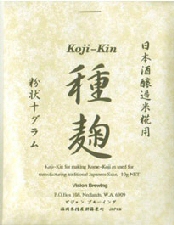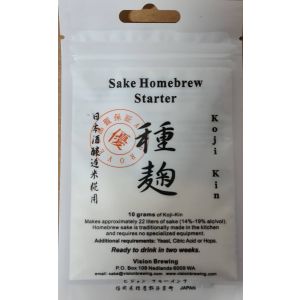Sake - Koji Kin Home Brew Kit
Sake Kit- Koji Kin mould

Sake - Rice Wine - Mould
These are the seeds of the mould that is used in the conversion of starch to sugar and is responsible for the complex and interesting flavours created in the brewing process.
A 10 gram packet will produce approximately 6 kilos of Koji Rice (rice that has been enriched with enzymes from the growth of Koji).
This will produce approx. 22 litres of Sake.
Each order comes with instructions of the sake making process and detailed instructions on how to use this product to make sake.
No other specialised materials are needed to make home brew sake
Rice that has the correct mould growing on it will act like malt and convert further rice (starch) to sugar.
This is the principal of Sake making.
We refer to this rice as MALT-RICE (correct terminology is Kome-Koji). Your Sake Kit contains 10 grams of mould seeds (Koji- Kin): this material contains the mould seeds that will grow on rice to make enzyme rich malt-rice (Kome-Koji) and create complex and interesting flavours similar to mould use in cheese making.
Instructions for Basic Homebrew Sake (producing 3 liters)
400 grams of rice (medium or short grain): 0.5 teaspoon of Koji Kin
Equipment: One colander, sieve or bamboo steamer to contain rice Cotton cloth to absorb water condensation from the saucepan lid (see additional notes) One large saucepan to contain sieve/colander/bamboo steamer or a tradional 2 part steamer saucepan.
Procedure:
1.Wash 400g(0.9lb) of rice (medium or short grain) until the water clears, soak the rice for about one and a half hours and then put the rice in a basket or sieve for at least 20 mins to drain off any excess water.
2.Steam cook the rice. Steam cooked rice looks slightly transparent, not white. (N.B. make sure that the rice is not in direct contact with the boiling water
3.Cool down the cooked rice to 30°centigrade (86° F). Put the rice into an enamel or stainless steel container and add 1.5 grams (0.5 teaspoon)of mould-seeds (Koji-Kin), this can be mixed with a teaspoon of plain flour to help distribution. Cover the container with moistened cheese or cotton cloth to prevent drying. A very fine metal sieve /tea strainer is very useful for the distribution of seeds. The spore packet contents are unaffected by repeated openings.

